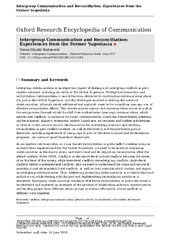Приказ основних података о документу
Intergroup Communication and Reconciliation: experiences from the Former Yugoslavia
| dc.creator | Nikolić-Ristanović, Vesna | |
| dc.date.accessioned | 2021-06-17T13:44:17Z | |
| dc.date.available | 2021-06-17T13:44:17Z | |
| dc.date.issued | 2018 | |
| dc.identifier.isbn | 9780190454524 | |
| dc.identifier.uri | http://rfasper.fasper.bg.ac.rs/handle/123456789/2871 | |
| dc.description.abstract | Intergroup communication is an important aspect of dealing with intergroup conflicts in postconflict societies, including countries of the former Yugoslavia. Widespread monolithic and authoritarian communication is one of the main obstacles to constructive communication about the past in the former Yugoslavia, and the challenges involved in shifting the nature of communication, although rarely addressed and explored, seem to be a condition sine qua non of effective reconciliation efforts. This should include contact and communication issues as well as the very process through which the shift from authoritarian (one-way) communication, which perpetuates conflicts, to inclusive (two-way) communication, which has reconciliatory potential, can be achieved. Allport’s intergroup contact hypothesis, its revisions and further elaborations in relation to the use of inclusive communication for overcoming divisions and reaching reconciliation in post-conflict societies, as well as restorative and transformative justice literature, including experiences of using yoga as part of restorative justice and reconciliation programs, can serve as good theoretical departures. As we explore communication as a way toward reconciliation in post-conflict societies using as an illustration experiences from the former Yugoslavia, we need to be aware of intergroup communication on the macro, meso, and micro level and its impact on reconciliation after the armed conflicts of the 1990s. Conflicts on the macro level include conflicts between the states, or on the level of the society, while meso-level conflicts are intergroup conflicts; micro-level conflicts relate to interpersonal conflicts. Also we need to understand the scope and nature of interethnic and other intercultural conflicts, as well as their socio-historical context and impact on intergroup communication. Thus, addressing intergroup communication in a constructive and inclusive way while dealing with the past and implementing reconciliation initiatives is important. Intergroup communication initiatives that foster reconciliation in particular need to be identified and explored, as examples of the practice of establishing inclusive communication and binding people from different ethnic groups and those affected by armed conflicts in different ways together. | |
| dc.language | en | |
| dc.publisher | New York: Oxford University Press | |
| dc.publisher | Oxford University Press USA | |
| dc.source | U: H Giles & J Harwood (ur) The Oxford encyclopedia of intergroup communication | |
| dc.subject | conflicts | |
| dc.subject | intergroup communication | |
| dc.subject | optimal contact | |
| dc.subject | reconciliation | |
| dc.subject | civil society | |
| dc.subject | the former Yugoslavia | |
| dc.title | Intergroup Communication and Reconciliation: experiences from the Former Yugoslavia | en |
| dc.type | conferenceObject | |
| dc.rights.license | closedAccess | |
| dc.rights.license | ARR | |
| dc.citation.epage | 690 | |
| dc.citation.other | https://oxfordre.com/communication/view/10.1093/acrefore/9780190228613.001.0001/acrefore-9780190228613-e-388 | |
| dc.citation.rank | M14 | |
| dc.citation.spage | 671 | |
| dc.identifier.doi | 10.1093/acrefo/9780190454524.001.0001 | |
| dc.identifier.doi | 10.1093/acrefore/9780190228613.013.388 | |
| dc.identifier.fulltext | http://rfasper.fasper.bg.ac.rs/bitstream/id/8805/bitstream_8805.pdf | |
| dc.type.version | publishedVersion |


